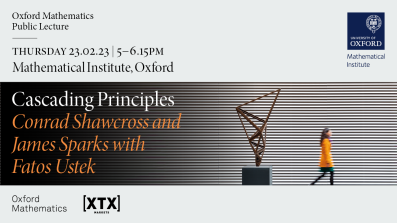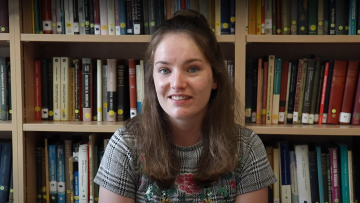17:00
Cascading Principles - Conrad Shawcross, Martin Bridson and James Sparks with Fatos Ustek
Oxford Mathematics Public Lecture
Cascading Principles - Conrad Shawcross, Martin Bridson and James Sparks with Fatos Ustek
Thursday 23 February, 2023
5pm - 6.15pm Andrew Wiles Building, Mathematical Institute, Oxford
Cascading Principles is an exhibition of nearly 40 stunning, mathematically inspired sculptures which are living alongside the mathematicians that inspired them in the Andrew Wiles Building, home to Oxford Mathematics. In this 'lecture', chaired by exhibition curator Fatos Ustek, Conrad will talk about what motivates his work, and how the possibilities and uncertainties of science inform his art. In turn, mathematicians Martin Bridson and James Sparks will describe how a mathematician responds to art motivated by their subject.
There will be an opportunity to view the exhibition from 4pm on the day of the lecture.
Conrad Shawcross specialises in mechanical sculptures based on philosophical and scientific ideas. He is the youngest living member of the Royal Academy of Arts. James Sparks is Professor of Mathematical Physics and Head of the Mathematical Institute in Oxford. Martin Bridson is Whitehead Professor of Pure Mathematics in Oxford and President of the Clay Mathematics Institute. Fatos Ustek is a curator and writer and a leading voice in contemporary art.
Please email @email to register.
The Oxford Mathematics Public Lectures and the Conrad Shawcross Exhibition are generously supported by XTX Markets.

scrambling
16:00
Collisions in supersingular isogeny graphs
Abstract
In this talk we will study the graph structure of supersingular isogeny graphs. These graphs are known to have very few loops and multi-edges. We formalize this idea by studying and finding bounds for their number of loops and multi-edges. We also find conditions under which these graphs are simple. To do so, we introduce a method of counting the total number of collisions (which are special endomorphisms) based on a trace formula of Gross and a known formula of Kronecker, Gierster and Hurwitz.
The method presented in this talk can be used to study many kinds of collisions in supersingular isogeny graphs. As an application, we will see how this method was used to estimate a certain number of collisions and then show that isogeny graphs do not satisfy a certain cryptographic property that was falsely believed (and proven!) to hold.


